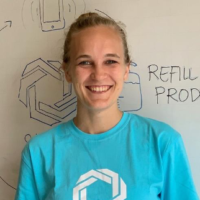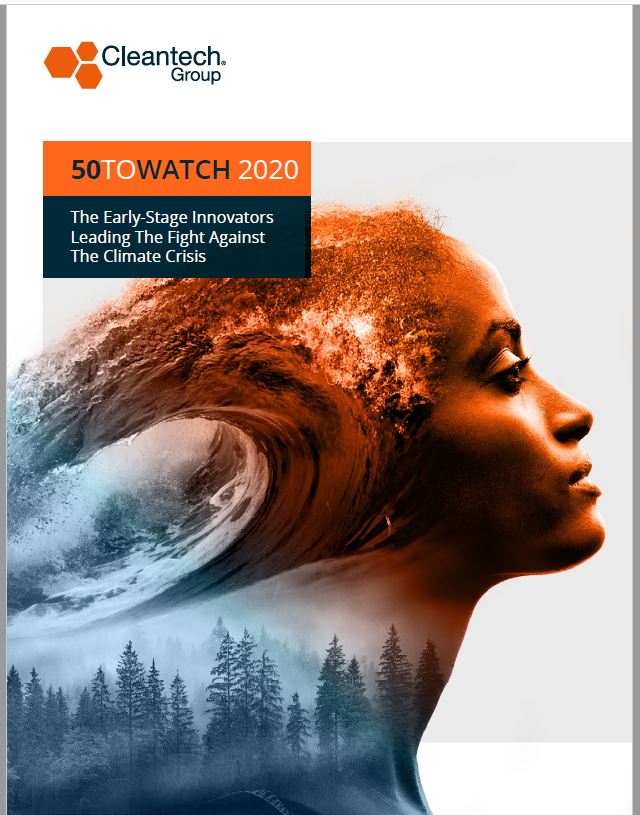Fighting the Plastics Crisis with Reusable Containers – Siklus makes the 2020 50 to Watch List
While taking a backseat to the health crisis in the last few months, climate change is increasingly shaping our daily experience with wildfires, droughts, hurricanes and pollution. In the face of this worsening crisis, we are witnessing the rise of a fresh generation of innovators creating new technologies and business models that could solve the plastics crisis, regenerate soils, seed new forests, create climate-positive buildings and end desertification. Now in its second year, Cleantech Group’s 50 to Watch list recognizes these extraordinary trailblazers fighting the good fight, for all of us.
A Solution in Focus
We are thrilled to announce that Siklus made our 2020 50 to Watch list. Siklus sells consumer goods such as shampoo and detergents directly to customers in reusable containers. We talked to Jane von Rabenau, CEO, to hear more.

What global challenge made you start Siklus?
While I was working in India, I came to learn that low-income populations use sachets for consumer products. That seemed unfair as the cost per volume is really high and people would spend a significant share of their income on these. This is referred to as the poverty tax. These communities were also excluded from waste management services, so all this plastic either ends up burnt, which leads to respiratory diseases, or gets dumped into the nearest river and ends up in the ocean. In areas where floods are common, plastic waste can even block drains. Of course, these sachets are not recyclable.
The question I asked myself was this: could there be a more sustainable and cost-effective alternative to sachets? I did some research and found some companies using vending machines to dispense consumer products. I started off by focusing on Indonesia, which is the second highest ocean plastic polluter in the world. I moved to Indonesia in late 2019 and dove right in. I talked to people in low-income communities, finding what exactly they would be interested in. From there, I took the conversation to consumer goods companies and they were interested in the model I was proposing. They also were interested in seeing where we could save on packaging costs as well as getting reliable data on consumer purchasing habits.
Are consumer goods companies driving this poverty tax? Or is the extra margin made by small vendors?
The poverty tax is built into the consumer goods pricing model and the end retailer only gets 15% of the revenue. Sachets are generally expensive for such a small amount of product because you still need to factor in packaging and transportation costs. People don’t really calculate the per-volume cost and end up spending much more than if they bought in bulk. Obviously, not everyone can buy products in bulk, so this is another disadvantage for low-income communities.
What is your solution and how did you develop it?
After our initial market research, we ran a pilot with a minimum viable product which provided refill stations -for shampoo, detergent and other consumer goods- where customers brought their own containers. It was very successful and helped us get support from both venture capitalists as well as consumer goods companies wanting to do pilot programs.
We have two goals with this solution: offer basic products at a lower cost and reduce plastic waste at the source. By allowing customers to purchase refill products in their very own containers, it enables them to save money and reduce plastic pollution at the same time. Also, while we are being mindful of waste, our team designed containers that help customers portion the products used in their daily activities. Our development process involved many dialogues with members of the communities where Siklus is present and listening to what the customers need. For our next step, we are looking to making containers more aesthetically pleasing, so consumers have an even better experience.
 Siklus mobile refill cart
Siklus mobile refill cart
Where are you currently based and where do you plan to expand?
We are currently based in Jakarta, Indonesia. We plan to expand to other cities as well, once COVID-19 allows us to. This kind of solution works best in low-income communities, where the waste management system is not satisfactory.
What is your business model?
We have two ways of distributing our products: one is a stationary refill station and the other is a mobile refill cart. The mobile carts go around neighborhoods at specific times and play a little jingle to let people know we are here. We use WhatsApp, as well, to ensure customers know of timings for their neighborhoods. Customers can bring their own containers or buy reusable containers from us at a discount. We use smart dispensing technology to avoid any issues with tampering and have portion control using precise measurements. We offer a variety of products including detergents, cooking oil, washing powder and shampoo, and we are expanding into other dry products, like coffee.
One concern we have noticed is getting people to trust that we are selling genuine products and not knock-offs. This is another reason for partnering with brands directly.
At the beginning, we would buy products from retailers in large quantities, then we moved on to buying in bulk from distributors, and now, for some products, we are sourcing directly from the brands in 20 lt. containers. Once finished, these containers are collected by the producers for cleaning, refilled and returned to us in a complete circular system. This helps ensure that we have a robust supply chain and can remove as much packaging cost as possible.

Common brands on tap
How do you quantify success in your model?
We have three metrics for success. The first is the actual savings made by the consumer. The second is the additional income for the sellers (both stationary and mobile). And the third is the quantity of plastic waste reduced.
We have had support and encouragement from local governments and municipalities as well, which shows we are doing something right!
How do you imagine the business will look in five years?
We hope we will have scaled throughout Indonesia and will have started start to look beyond. We also want to educate people on plastic waste, raise awareness about consumption and disposal and change consumer behavior.
What most surprised you in building Siklus?
I learnt a lot about consumer behavior. For instance, many bottles are designed to promote over-using. Our customers find that when they use bottles, they dispense more product than intended and needed. So, they prefer to use sachets which allow them to control exactly how much they use. Some of our customers buy 12 or even 24 sachets at a time, which is the content of a bottle. When I started thinking about this, I realized from my own experience that oftentimes I use the first 80% of a shampoo bottle in 2 months, and then, since I am too lazy to buy another one, I stretch the last 20% over another 2 months, or so. This means that I massively overused the product at the beginning. Yet, this is something that I had never thought about. I think about rent costs and how much I spend eating out, but never about how much shampoo I use, since it’s such a small fraction of my spending. Low-income communities are very aware of this, though, and they have to be, given how expensive these products are for them. This also explains the success of sachets- they help control portions.
Was there something along the way that nearly made you quit?
Quite recently there was! We were in talks for an investment, and then COVID hit and deals were getting cancelled left and right. That was really scary because we had put so much effort into the deal and we were really on our last leg, financially. Thankfully, we were able to close the investment and are more motivated than ever to make a difference!
Looking For the Innovative Early-Stage Companies Working to Fight The Climate Crisis?
 Our latest report will bring you closer to the innovators and decision makers committed to finding and bringing to market solutions to the life-threatening challenge of the climate crisis.
Our latest report will bring you closer to the innovators and decision makers committed to finding and bringing to market solutions to the life-threatening challenge of the climate crisis.
- Meet a new generation of innovators working to deliver sustainable change.
- Discover case studies of companies in agtech, electrification and plastic.
- Get to know cleantech investors boldly pushing for change.


